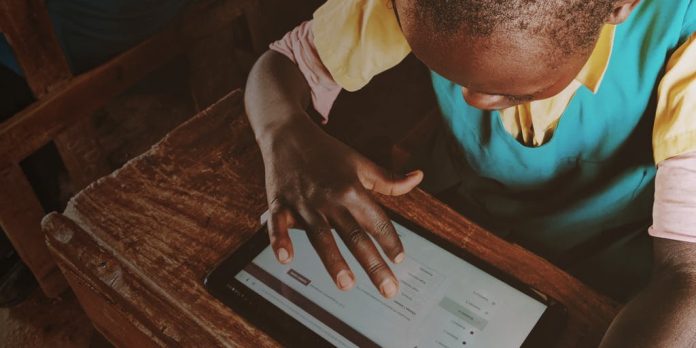Entry to high-quality schooling is well known as a pivotal device for assuaging poverty, mitigating the unfold of illness and malnutrition, fostering kids’s total welfare and empowering girls. Unsurprisingly, the United Nations asserts that high quality schooling shouldn’t be solely a elementary human proper but additionally an important catalyst for financial development and improvement.
Countless Community, a worldwide group devoted to selling fairness and accessibility, invests strategically in corporations worldwide to handle challenges akin to restricted entry to high quality schooling. This text focuses on a kind of organizations, Studying Equality.
Studying Equality provides instructional alternatives for the two.6 billion individuals worldwide with out web entry. It focuses on delivering high quality educating and studying by means of know-how with out the web. The nonprofit was based in response to the worldwide wildfire adoption of its first-generation studying platform, KA Lite, which supplied offline entry to Khan Academy movies and workout routines. This made clear the sheer want and readiness for offline-first edtech instruments that deal with challenges in connectivity and entry to high quality digital studying supplies in low-resource contexts.
Harnessing its learnings from KA Lite, the group has advanced and expanded its influence by growing an ecosystem of open merchandise and instruments known as Kolibri. Kolibri allows offline entry to a curated library of instructional content material, helps custom-made curricula creation and facilitates self-paced, differentiated and project-based studying.
Not too long ago, EdSurge spoke to Lauren Lichtman, head of technique and partnerships, about Studying Equality’s distinctive collaborative method to enabling fairness in schooling by means of know-how. Lichtman applies her personal expertise constructing relationships to her ardour for figuring out options that break down boundaries to high quality studying.
EdSurge: What’s Studying Equality’s imaginative and prescient within the subject of schooling?
Lichtman: Studying Equality’s imaginative and prescient is to create an equitable world wherein all learners develop their very own company, create constructive transformation and flourish. The method entails constructing adaptable and user-friendly options, selling natural and scalable edtech use, prioritizing student-centered and equitable studying experiences, advocating for programs change and actively constructing studying communities. All of that is a part of our idea of change. We take a bottom-up method to schooling know-how in a means that’s contextual and accountable.
What do you imply by a bottom-up method?
After I say bottom-up, I imply that we allow organizations to have possession over how they contextualize schooling know-how particular to their native wants and expertise. Our objective is to allow sharing in a means that is not directive. Our method is designed to complement and complement what’s already taking place in formal school rooms and help versatile edtech use throughout quite a lot of studying environments. With Kolibri, we offer a free and open-source studying platform that is actually designed for learners with restricted digital literacy abilities, so there aren’t as many boundaries to adoption. Kolibri isn’t preloaded with any particular content material, however we now have a library of content material for organizations, curriculum designers and others to choose from and instruments to prepare content material in line with the curriculum. We offer openly-licensed documentation, steerage supplies and coaching supplies by means of the Kolibri Edtech Toolkit to assist organizations arrange Kolibri on their very own and prepare educators and employees on find out how to mix know-how into their studying environments. All of this helps a community-driven, bottom-up method. This do-it-yourself adoption mannequin is without doubt one of the issues that makes Studying Equality actually distinctive and the attain actually broad — greater than 10 million individuals throughout 220 international locations and territories.
It’s vital to notice that whereas this mannequin helps broad adoption at scale, Studying Equality additionally works in partnership with organizations working at scale or throughout contexts, and generally that features partnering with Ministries of Training to help the supply of Kolibri at scale in a extra top-down method. Even on this case, Kolibri provides company to educators and organizations to make use of it in a means that is sensible for the actual studying atmosphere.
How is Studying Equality addressing the problem of the digital divide and the two.6 billion individuals with out web entry?
First, it is vital to consider the totally different aspects of the digital divide. The time period digital divide usually refers to not having reasonably priced entry to the web or particular {hardware}. However one other vital side is considering digital literacy abilities and digital rights. Learners who aren’t related to the web do not have as many alternatives to study with know-how or to develop digital abilities that are more and more obligatory for the workforce. We’ll solely see this divide widen with the onset of generative AI the place its use is reliant on robust web connectivity.
We consider connectivity alongside a spectrum; it is not black and white. It is usually the case that you simply may need some web, but it surely’s intermittent and with restricted bandwidth. Due to that, we have targeted on utilizing connectivity — when it does exist — in sensible methods to reinforce educating and studying. For instance, Kolibri will be put in and up to date with the software program and content material in several methods. A technique is immediately from the web, however the different is from having it put in domestically with a USB or onerous drive or peer-to-peer with close by units. Then, even when putting in Kolibri, organizations solely import the content material they want on account of bandwidth issues. Moreover, Kolibri is designed to run on low-cost and legacy units, so you do not want the most recent and biggest {hardware} for it to run.

How does Studying Equality collaborate with companions to know and help the distinctive wants of various contexts, and the way is that this mirrored within the design of its instructional instruments?
Getting suggestions from our neighborhood and companions is a core product improvement side. All the things we do in our roadmap is knowledgeable by and/or developed in collaboration with our neighborhood. Now we have 4 core design rules that drive our improvement of merchandise: equitable entry, efficient studying, neighborhood possession and constant experiences. Whereas we help the do-it-yourself mannequin that I already talked about, we associate immediately with organizations to check and iterate on Kolibri in order that we are able to construct a greater product.
For instance, our subsequent model of Kolibri options the power for learners to follow taking previous exams as a device for self-assessment. This new function grew out of suggestions from Vodafone Basis and UNHCR’s Instantaneous Community Faculties programme, which has been utilizing Kolibri since 2018 to help refugee learners. This model additionally permits organizations collaborating with Studying Equality to make use of Kolibri to survey its learners, lecturers and directors to help ongoing monitoring and analysis throughout a program. This particular function was initially pushed by an evaluation by the Harvard EASEL Lab of the usage of Amal Alliance’s Colours of Kindness with Kolibri.
We’ve additionally collaborated with organizations like Shoulder to Shoulder in Honduras, which works intently with the Division of Training to help improved studying outcomes, and its curriculum-aligned CREE content material is now included publicly within the Kolibri Library for anybody to make use of.
Extra lately, we labored to know find out how to leverage Kolibri to help project-based studying to enhance foundational abilities by means of a brand new venture in Uganda. We partnered with two organizations to co-develop and implement this method with a curriculum aligned with the nationwide requirements particularly for over-age, out-of-school refugee learners for grade three equal. In simply 12 weeks, we noticed math scores improve from 44 to 87 p.c, literacy scores improve from 13 to 71 p.c and important beneficial properties in social-emotional abilities.
It is very important be aware that not all of our collaborations exist outdoors of america. For instance, we labored with an middleman unit in Pennsylvania to help learners with restricted connectivity throughout COVID to make sure they’d entry to the required studying supplies.
One other use case for Kolibri in america is in correctional programs. Now we have supported the Idaho Division of Corrections to assist learners with STEM topics and the acquisition of GEDs. Usually, these learners developed the talents to turn into mentors or coaches throughout the system, supporting others to study.
Find out how to become involved in Studying Equality’s work: There are numerous methods wherein you, too, may help make high quality instructional alternatives accessible to everybody.


